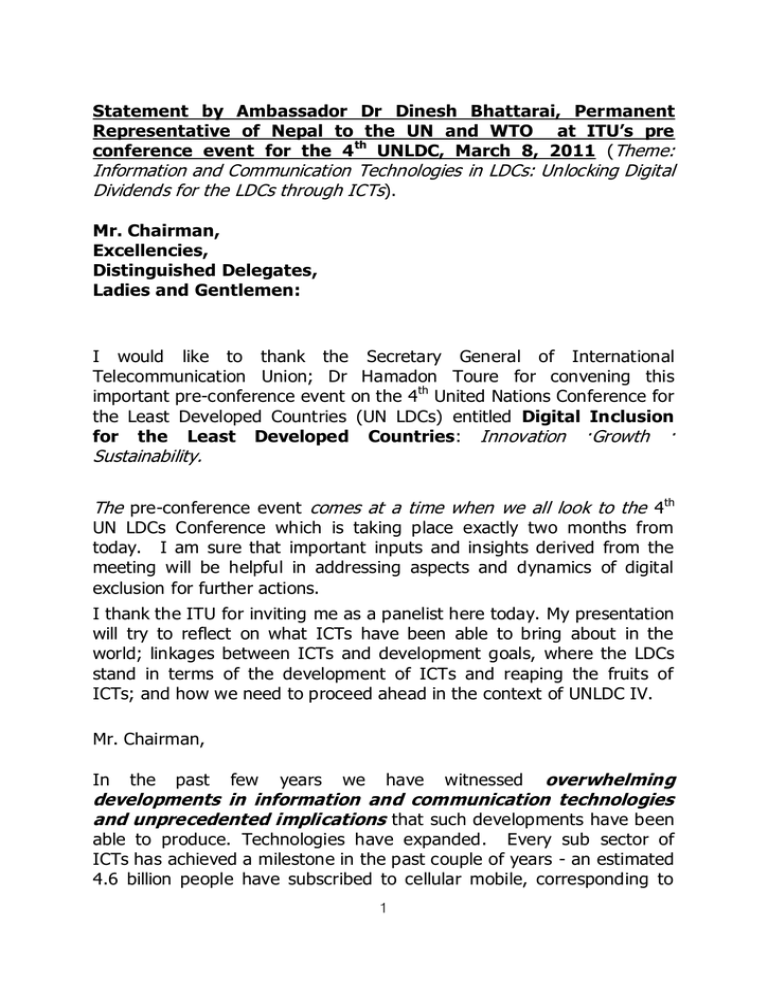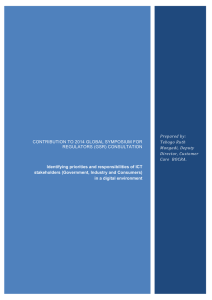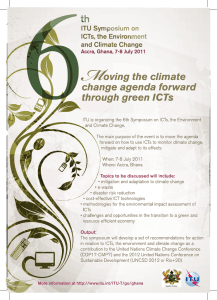Statement by Ambassador Dr Dinesh ... Representative of Nepal to the ...
advertisement

Statement by Ambassador Dr Dinesh Bhattarai, Permanent Representative of Nepal to the UN and WTO at ITU’s pre conference event for the 4 th UNLDC, March 8, 2011 (Theme: Information and Communication Technologies in LDCs: Unlocking Digital Dividends for the LDCs through ICTs). Mr. Chairman, Excellencies, Distinguished Delegates, Ladies and Gentlemen: I would like to thank the Secretary General of International Telecommunication Union; Dr Hamadon Toure for convening this important pre-conference event on the 4th United Nations Conference for the Least Developed Countries (UN LDCs) entitled Digital Inclusion for the Least Developed Countries: Innovation ·Growth · Sustainability. The pre-conference event comes at a time when we all look to the 4th UN LDCs Conference which is taking place exactly two months from today. I am sure that important inputs and insights derived from the meeting will be helpful in addressing aspects and dynamics of digital exclusion for further actions. I thank the ITU for inviting me as a panelist here today. My presentation will try to reflect on what ICTs have been able to bring about in the world; linkages between ICTs and development goals, where the LDCs stand in terms of the development of ICTs and reaping the fruits of ICTs; and how we need to proceed ahead in the context of UNLDC IV. Mr. Chairman, overwhelming developments in information and communication technologies and unprecedented implications that such developments have been In the past few years we have witnessed able to produce. Technologies have expanded. Every sub sector of ICTs has achieved a milestone in the past couple of years - an estimated 4.6 billion people have subscribed to cellular mobile, corresponding to 1 67 percent of worldwide population; internet use has expanded to an estimated 26 per cent of the world’s population (or 1.7 billion people). Despite economic recession in larger part of the world, ICTs sector exhibited a strong resilience, continuously contributing in growth and creating jobs. The cost of ICT services has dropped almost everywhere and ICT Price Basket dropped in an average by 15 percent around the world. The revolutions in ICTs are said to have electrifying impacts in economic, social and poltiical spheres as being witnessed across different continents in recent days. Technology has brought miracles in social networking - 360 million active users of facebook; nearly 400 million Qzone users; over a billion bloggers and twitters! This was something beyond our imagination a few years back but has now become a reality. Social networking has shown potential to reinvent political and civic participation; enhance freedom of expression; and empower youth. Connection has helped to breakdown traditional barriers of socio-economic status, age and gender. This has also high stakes for underdeveloped economies with disproportionately young and unemployed population. This will also add pressures for undemocratic, unpopular and weak regimes to become more open and accountable. It has been of good use to promote the values of freedom, equality and human rights. It has also created grounds for cybercrimes of various nature and magnitude. Terrorists have been using ICT to spread terror networks. Mr. Chairman, Linkages between ICTs and development goals There is a strong link between ICTs and global development goals – be they the Millennium Development Goals (MDGs) or Brussels Programs of Action (BPoA) or the deliverables to be agreed upon in the UNLDC IV. ICTs are a means of ensuring sustainable development and building an inclusive society. ICTs can serve a means of social inclusion and participation in social, economic and political life. Access to information and means of information and communication is indeed a great leveler enhancing education, raising awareness, and empowering people. ICTs 2 provide a means of continued learning, ‘encompassing people that are outside the formal education processes, and improving professional skills. ICTs create new opportunities for growth and development. There has been an intersection of the development of ICTs and rise of economic powerhouses. It has been a powerful means of poverty reduction, source of jobs to millions. Development of ICTs can enhance economic growth; change the structure of economy and lead to a knowledgebased economy. It helps in ensuring inclusiveness, and increased participation of people in decision making and respect for human rights. ICT tools help enhance participation in decision-making; create new opportunities for women. E-government is an innovative means of effective service delivery and transperant and clean public administration. Access to information is a backbone of democratic society and inclusive democracy is prerequisite of a prosperous society. Informed people; vibrant civil society; strong media and successful democracy are closely interlinked. It can promote internal social and political stability which is basic to the peace, security and economic growth. ICTs can create trade and facilitate trade via lower transaction costs, improved information, and an increasing range of tradable products. Transferring technologies and diffusing innovation has brought improvement in trade, FDI, and productivity and growth. Natural and manmade disasters are a big threat to survival and sustainability in today’s world. The most vulnerable and least developed countries are ironically the least prepared to face disasters. ICTs are instrumental in raising awareness about environment and sensitizing on the growing threats of climate change. They also assist in monitoring, mitigating and adapting to climate change. ICTs can play an important role in predicting disasters, disseminating early warning and assisting in appropriately managing them. Emergency telecommunication is requisite to enable timely flow of vital information in executing rescue and relief operations and other humanitarian assistance. 3 ICTs’ contribution in health services is equally worth mentioning. Telemedicine has not only enhanced access to medical services and reduced the distance and cost of medical consultations, but also has contributed in promoting medical training, education, and research. Mr. Chairman, Now the status of the access to technology Breakthrough in technologies is of course important; equitable access around the world is equally important. Today, close networking in one part of the world comes with isolation in aonther. There are two dimensions of digital divide: the divide that exists within coutries between the rural and the urban population; the rich and the poor and the one that exists across countries and regions– the developed, developing and the least developed. Despite the optimistic observation that the digital divide is shrinking, the pace of gap reduction has been too slow. While it is pleasing to note that ICT connectivity has improved in LDCs over the past decade, the speed and magnitude of improvement has not been at par with the necessity. Figures reveal glaring disparity in every indicator of ICTs. According to the latest ITU report on Measuring the Informations Society, internet penetration for example in developed countries reached 64 per cent at the end of 2009 while in developing countries it is only 18 per cent and in LDCs the number stands at incredible 2.1% . When we are talking big about the ICT revolution in the world, it is a big developmental irony that 98 out of every 100 people in least developed countries are excluded from internet access. Likewise, cellular mobile penetration is 100% in developed countries, 57% in developing countries and is just over 20% in the least developed countries. Disparity of over 10 times exists in ICT price index. While people in developed countries spend relatively 1.5 per cent of GNI per capita on ICT services, people in developing countries have to spend 17.5 per cent of their income on the same. Likewise, average mobile cellular prices vary substantially, ‘ranging from as little as 1.1 per cent of monthly income in Europe to as much as 17.7 per cent in Africa’. The story of broadband has been the most difficult – the high-speed internet connection costs for example 500 per cent of average monthly GNI per 4 capita in Africa, making this service ‘effectively inaccessible’. In Europe, fixed broadband services are available at less than two per cent of average monthly income. 14% of the world population, mostly from developed countries, belong to the category of high ICT level while in the lowest level belong to 36% of the world population, mostly from the least developed countries in Asia and Africa. Mr. Chairman, Let us briefly take an overview of the LDCs and where do they stand in terms of the development of ICTs. LDCs constitute 1/4 th of the international community. Since 1970s, when a group of developing countries were identified as the most vulnerable with weak economic, institutional, human resources and geophysical handicaps, they have increased from 25 in 1971 to 48 today. About 12% of the world population lives in LDCs, 72% of which lives in rural areas. In terms of WTO membership, they constitute 21%, and 12 out 26 countries that are in line of accession happen to be LDCs. LDCs are thus the significant members of the international community. All bottom 19 countries out of the 159 countries studied by ITU in the context of ICT Development Index are LDCs, with miserable score that ranges from 1.3 to 0.76 while the top score is over 7. Likewise, all bottom 12 countries in ICT access sub index and bottom 13 in ICT skills sub index are LDCs. All bottom 15 countries in ICT Price Basket are LDCs, meaning ICT facilities are the most expensive as compared to the per capita GNI in LDCs. While the ICT Price Basket is around or less than 1 point in most developed countries it ranges as high as 20 to 67 points in Least Developed Countries. All 10 countries that measure the price index over 50 are LDCs. All bottom 10 countries in fixed telephone sub basket; bottom 17 in mobile cellular sub basket and bottom 14 in fixed broad band sub basket are LDCs. In broadband least developed countries fare the worst – some LDCs have to spend over 2000% of GNI per capita in fixed broad band, rendering this service effectively impossible to afford. Rising inequality and unsustainable macroeconomic imbalances and heightened economic volatility have further complicated it. This also poses a big question to ITU Secretary General’s enthusiastic remark that the year 2010 ‘marks the beginning of what must become 5 the decade of broadband.’ Mr. Chairman, Despite the commitments expressed collectively by the international community through the Millennium Declaration, Brussels Programme of Action, Doha Development Agenda and Tunis Agenda for the World Information Society, among others, concrete results have been scarce in Least Developed Countries. Only four countries have been able to graduate. Needless to say that without equity, sustainability is impossible and peace, prosperity and stability of the world is far from ensured. Business as usual is therefore is not going to change the situations. We need to change our approach, be true to our commitments and expedite our collective efforts. UN Conference on the Least Developed Countries provides us a significant platform to reflect on where we need to focus to can deliver. We have spent 10 odd years since Millennium Declaration; 5 odd years since the WSIS Tunis and have less than 5 years to meet the MDGs by 2015. Unless we act with a sense of urgency, our shared commitments are going to be rendered fruitless. ICTs can foster development, particularly by enhancing connectivity, promoting awareness, ensuring transparent governance, catalyzing growth and creating jobs, among others. ICTs therefore need to be mainstreamed in every development discourse including the UNLDC IV. This invites conceptual change in policy making and policy implementation: ICT is not an additional luxury; it is a ‘basic utility as essential as electricity, water and roads’. Given that majority of people in LDCs live in rural areas, ICTs should be deemed as an essential means of rural connectivity and also a means of making rural life, including agriculture, more productive. LDCs need low-cost, affordable, appropriate and environmentally sound technologies: that are ‘easy to deploy’ and depend less on the level of development of other infrastructures. Article 66.2 and 67 of the TRIPS Agreement should be expeditiously implemented. As use of foreign technologies is highly dependent on a country’s level of absorptive capacity, LDCs should be assisted to building technological capabilities and creating an enabling environment for innovation and creativity. We need to focus on both what serves the best at present and what can be 6 of long term benefit. Development friendly, stable and predictable regulatory and legal framework is needed. Equally important is the development of human resources that can use ICTs and can help others to use them. While agreeing with the WSIS Tunis Agenda, international community including the development partners recognized the severity of the challenge of the digital divide. We all agreed on the need of adequate and sustainable investments in ICT infrastructure, capacity building and transfer of technology to developing and least developed countries. There has been a sea change in the situation since the Brussels meet. There is no one or two actors. We have entered into an age of shared power. The unprecedented connectivity should create inclusive coalitions of connected to act as a leveler and protect the weaker and poorest. I sincerely hope that the Istanbul Conference would serve a moment of transforming the commitments into deeds and unlocking the ‘digital dividends’ for LDCs through information and communication technologies. I thank you Mr. Chairman. 7






